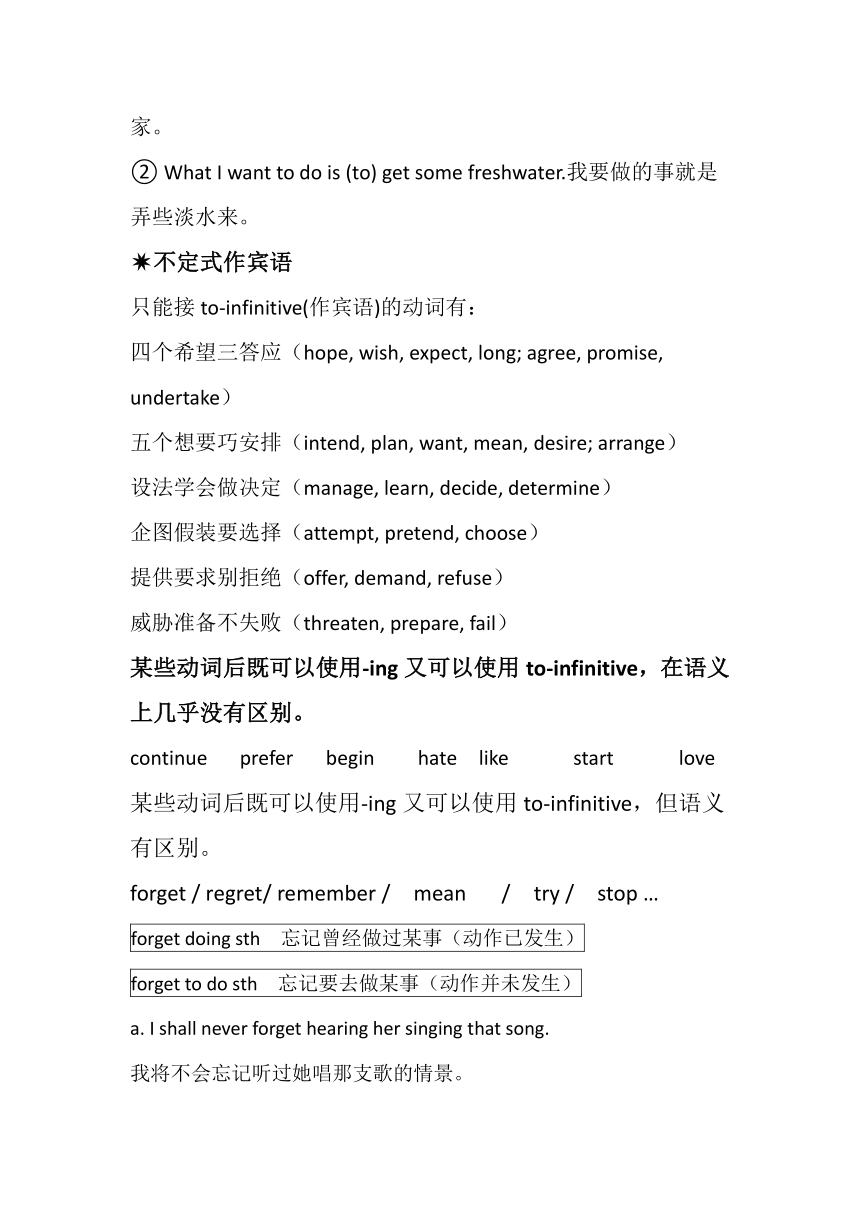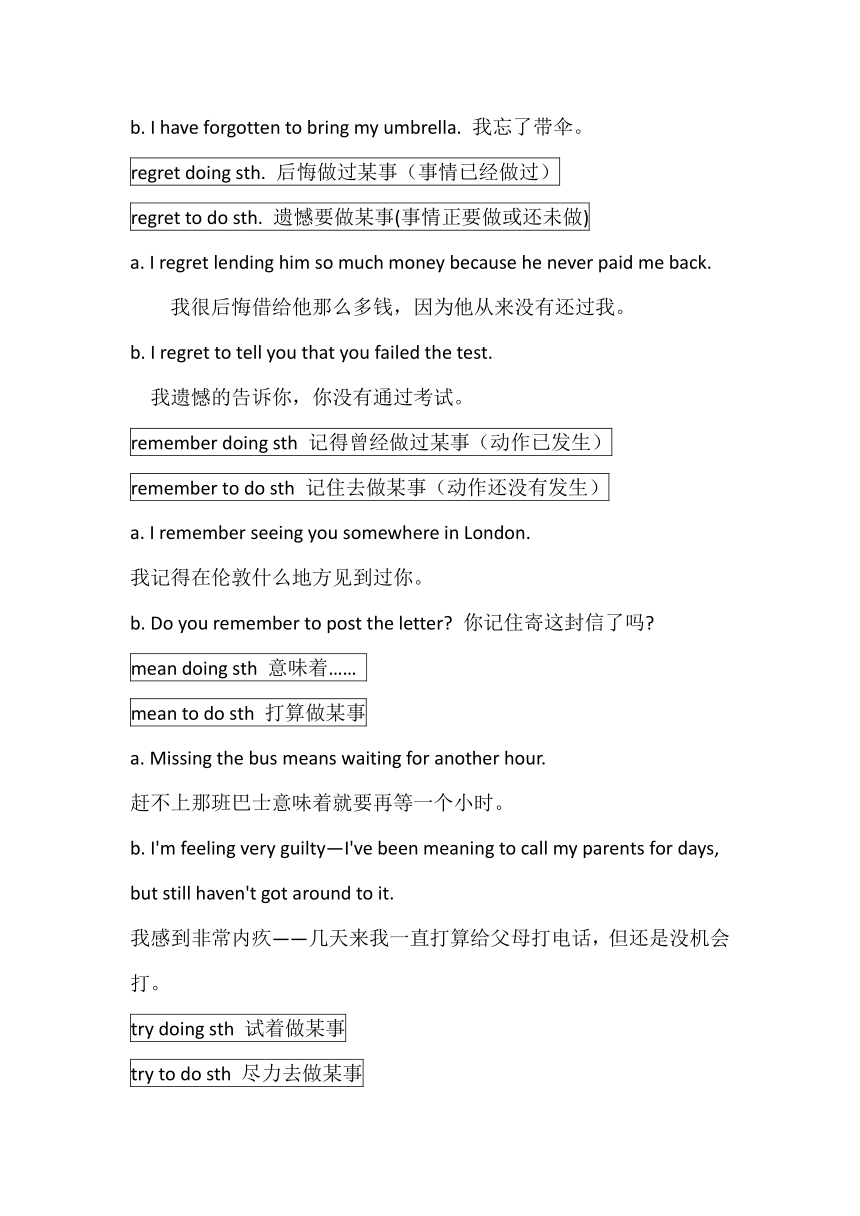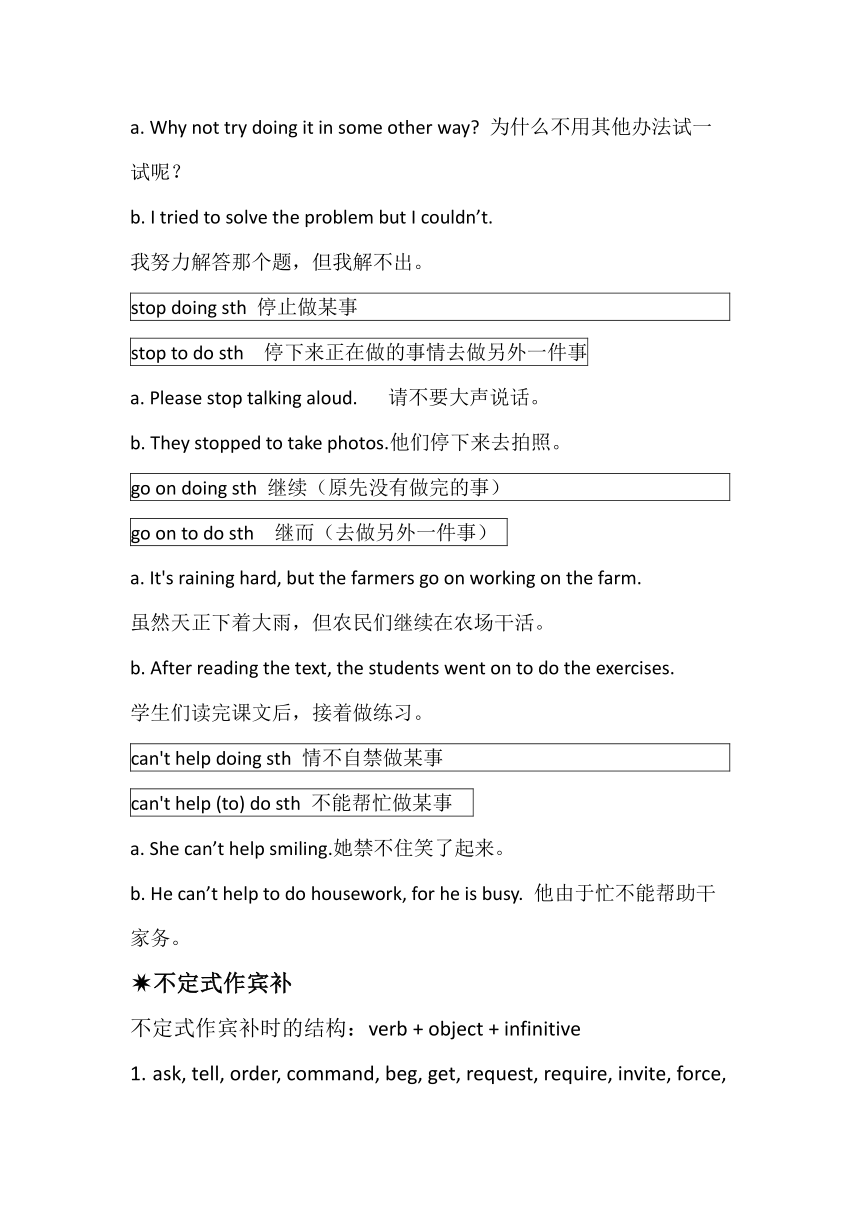不定式的用法 讲义-2026届高三英语上学期复习专项
文档属性
| 名称 | 不定式的用法 讲义-2026届高三英语上学期复习专项 |  | |
| 格式 | docx | ||
| 文件大小 | 20.0KB | ||
| 资源类型 | 教案 | ||
| 版本资源 | 人教版(2019) | ||
| 科目 | 英语 | ||
| 更新时间 | 2025-07-24 12:13:22 | ||
图片预览




文档简介
不定式的用法
不定式主要做主语 /表语/宾语 /宾补/定语 / 状语。
不定式作主语
单个不定式作主语时, 谓语动词用单数。若不定式太长, 往往用it作形式主语, 不定式后置。
1. To keep smiling is healthy for you.
2. It’s important to look up the new words in the dictionary when you study English.
不定式作表语
动词不定式形式作表语时表示的动作往往是具体的、一次性的动作,特别是将来的动作。通常主语是表示“目的,愿望,梦想,需求”等的名词或what引导的主语从句。
① Your task today is to wash the curtains.你今天的任务是洗窗帘。
② My purpose is to climb to the top of the snow mountain.
我的目标就是要爬到雪上的顶部。
③ What I need is to make them happy, not tired.我需要的是让他们快乐,而不是疲劳。
※当动词不定式用作表语时,其中的 to 原则上是不能省略的, 但是当主语部分有动词do(did/do/does)的某种形式时,用作表语的不定式可以省略to.
① What she could do was (to) go back home.她所能做的就是回家。
② What I want to do is (to) get some freshwater.我要做的事就是弄些淡水来。
不定式作宾语
只能接to-infinitive(作宾语)的动词有:
四个希望三答应(hope, wish, expect, long; agree, promise, undertake)
五个想要巧安排(intend, plan, want, mean, desire; arrange)
设法学会做决定(manage, learn, decide, determine)
企图假装要选择(attempt, pretend, choose)
提供要求别拒绝(offer, demand, refuse)
威胁准备不失败(threaten, prepare, fail)
某些动词后既可以使用-ing又可以使用to-infinitive,在语义上几乎没有区别。
continue prefer begin hate like start love
某些动词后既可以使用-ing又可以使用to-infinitive,但语义有区别。
forget / regret/ remember / mean / try / stop …
forget doing sth 忘记曾经做过某事(动作已发生)
forget to do sth 忘记要去做某事(动作并未发生)
a. I shall never forget hearing her singing that song.
我将不会忘记听过她唱那支歌的情景。
b. I have forgotten to bring my umbrella. 我忘了带伞。
regret doing sth. 后悔做过某事(事情已经做过)
regret to do sth. 遗憾要做某事(事情正要做或还未做)
a. I regret lending him so much money because he never paid me back.
我很后悔借给他那么多钱,因为他从来没有还过我。
b. I regret to tell you that you failed the test.
我遗憾的告诉你,你没有通过考试。
remember doing sth 记得曾经做过某事(动作已发生)
remember to do sth 记住去做某事(动作还没有发生)
a. I remember seeing you somewhere in London.
我记得在伦敦什么地方见到过你。
b. Do you remember to post the letter 你记住寄这封信了吗
mean doing sth 意味着……
mean to do sth 打算做某事
a. Missing the bus means waiting for another hour.
赶不上那班巴士意味着就要再等一个小时。
b. I'm feeling very guilty—I've been meaning to call my parents for days, but still haven't got around to it.
我感到非常内疚——几天来我一直打算给父母打电话,但还是没机会打。
try doing sth 试着做某事
try to do sth 尽力去做某事
a. Why not try doing it in some other way 为什么不用其他办法试一试呢?
b. I tried to solve the problem but I couldn’t.
我努力解答那个题,但我解不出。
stop doing sth 停止做某事 stop to do sth 停下来正在做的事情去做另外一件事
a. Please stop talking aloud. 请不要大声说话。
b. They stopped to take photos.他们停下来去拍照。
go on doing sth 继续(原先没有做完的事) go on to do sth 继而(去做另外一件事)
a. It's raining hard, but the farmers go on working on the farm.
虽然天正下着大雨,但农民们继续在农场干活。
b. After reading the text, the students went on to do the exercises.
学生们读完课文后,接着做练习。
can't help doing sth 情不自禁做某事 can't help (to) do sth 不能帮忙做某事
a. She can’t help smiling.她禁不住笑了起来。
b. He can’t help to do housework, for he is busy. 他由于忙不能帮助干家务。
不定式作宾补
不定式作宾补时的结构:verb + object + infinitive
ask, tell, order, command, beg, get, request, require, invite, force, permit, cause, forbid, allow, wish, want, expect, encourage, advise, persuade, warn, would like等动词可以接带to的不定式作宾补。
① The teacher told his students to pay more attention to their pronunciation.
②I would like the problem to be discussed at the next meeting.
③My mum asks me to play the piano for two hours every day.
2. see, hear, watch, feel, notice, let, make, have等感官动词、使役动词后跟不定式作宾补时,不加to。
①I never let my child stay in the house all day.
②Have him come in, please.
③ I heard her say that she’d like to go to the concert.
五看watch ,see ,look at, observe , notice 三使 let ,make ,have
二听 hear ,listen 一感觉 feel
当以上的动词用于被动式,to要还原。
1. They saw the boy fall suddenly from the tree.
→The boy was seen to fall suddenly from the tree.
2.Mother made John wash the car for a week.
→John was made to wash the car for a week.
不定式作定语
1. 不定式作定语,一般都是作后置定语,修饰前面的名词或代词。不定式作定语时与被修饰词存在逻辑上的关系。
① He is always the first person to come and the last one to leave. 他总是第一个来最后一个走。(主谓)
② The teacher left us a lot of problems to solve.
老师给我们留了很多题要解答。(动宾)
③ I have a wish to go to college.
我有一个上大学的愿望。(同位)
Tips !!!
1. 当被the first, the last, the only等词以及形容词最高级修饰时常用不定式作后置定语。
The last train to arrive was from Shenzhen.
2. something, anything, nothing, everything等复合不定代词常用不定式作后置定语。
I’ve grown so crazy about everything to do with nature.
3. 不定式作定语也可用在have … to do和there be句型中。
There is no one to take care of her.
I have no jewelry to wear.
当不定式作定语,且与被修饰的词语有逻辑上的动宾关系时,不定式动词应该是及物动词;若不定式动词为不及物动词,则该动词必须与介词连用,组成及物的动词短语。
Please pass me some paper to write on
不定式作状语(不定式作状语可以表示目的、结果或原因等。)
目的状语
① He came here to attend an important meeting. 他来这儿参加一个重要的会议。
② He laid down his life to save the child.他为了救这个孩子献出了生命。
③ He shouted and waved in order to be noticed.他喊了一声,挥了挥手,以引起注意。
④ I'll write down his telephone number so as not to forget it.我会记下他的电话号码,以免忘记。
有时为了强调或突出这种目的,也可以用in order (not) to do,和so as (not) to do结构(so as to do不可以置于句首)。
2. 结果状语
① He returned home to learn his daughter had just been engaged.
他回家后得知女儿刚刚订婚了。
② He went home to find his old friend George waiting for him.
他到家发现他的老朋友乔治在等他。
③ What have I said to make you so excited 我说了什么使你这么激动
不定式作结果状语常与learn, find, see, hear, make等动词连用。
① She was so angry as to be unable to speak.她气得连话都说不出来。
② The boy is old enough to take care of himself. 这个男孩够大了,可以自己照顾自己。
③ He hurried to the station, only to find the train had left.
他匆匆忙忙赶到火车站,结果却发现火车已经走了。
④ I'm too tired to stay up longer.我太累了,不能再熬夜了。
不定式作结果状语常用于以下句型结构:
① so/such… as to do ② enough to do
③ only to do (常表示意外的或事与愿违的结果)
④ too … to do
3. 原因状语
① I'm glad to see you.很高兴见到你。
② Sam was very surprised to hear the news.萨姆听到这个消息很吃惊。
③ I was a fool not to listen to you at that time.我真是个傻瓜,当时不听你的话。
补充:不定式的时态语态
一般形式:(与主句谓语动词同时发生或在谓语动词之后发生) to do /be
完成式形式:(动作先于主句谓语动词) to have done/been
I’m sorry to have kept you waiting so long.
进行时: to be doing
He pretended to be sleeping when his father came home.
被动式形式 :to be done 不定式与谓语动词之间为逻辑上的动宾关系
I need to be examined in the hospital
完成被动式形式:to have been done
He is said to have been admitted into Beijing University already .
完成进行时形式:to have been doing
不定式主要做主语 /表语/宾语 /宾补/定语 / 状语。
不定式作主语
单个不定式作主语时, 谓语动词用单数。若不定式太长, 往往用it作形式主语, 不定式后置。
1. To keep smiling is healthy for you.
2. It’s important to look up the new words in the dictionary when you study English.
不定式作表语
动词不定式形式作表语时表示的动作往往是具体的、一次性的动作,特别是将来的动作。通常主语是表示“目的,愿望,梦想,需求”等的名词或what引导的主语从句。
① Your task today is to wash the curtains.你今天的任务是洗窗帘。
② My purpose is to climb to the top of the snow mountain.
我的目标就是要爬到雪上的顶部。
③ What I need is to make them happy, not tired.我需要的是让他们快乐,而不是疲劳。
※当动词不定式用作表语时,其中的 to 原则上是不能省略的, 但是当主语部分有动词do(did/do/does)的某种形式时,用作表语的不定式可以省略to.
① What she could do was (to) go back home.她所能做的就是回家。
② What I want to do is (to) get some freshwater.我要做的事就是弄些淡水来。
不定式作宾语
只能接to-infinitive(作宾语)的动词有:
四个希望三答应(hope, wish, expect, long; agree, promise, undertake)
五个想要巧安排(intend, plan, want, mean, desire; arrange)
设法学会做决定(manage, learn, decide, determine)
企图假装要选择(attempt, pretend, choose)
提供要求别拒绝(offer, demand, refuse)
威胁准备不失败(threaten, prepare, fail)
某些动词后既可以使用-ing又可以使用to-infinitive,在语义上几乎没有区别。
continue prefer begin hate like start love
某些动词后既可以使用-ing又可以使用to-infinitive,但语义有区别。
forget / regret/ remember / mean / try / stop …
forget doing sth 忘记曾经做过某事(动作已发生)
forget to do sth 忘记要去做某事(动作并未发生)
a. I shall never forget hearing her singing that song.
我将不会忘记听过她唱那支歌的情景。
b. I have forgotten to bring my umbrella. 我忘了带伞。
regret doing sth. 后悔做过某事(事情已经做过)
regret to do sth. 遗憾要做某事(事情正要做或还未做)
a. I regret lending him so much money because he never paid me back.
我很后悔借给他那么多钱,因为他从来没有还过我。
b. I regret to tell you that you failed the test.
我遗憾的告诉你,你没有通过考试。
remember doing sth 记得曾经做过某事(动作已发生)
remember to do sth 记住去做某事(动作还没有发生)
a. I remember seeing you somewhere in London.
我记得在伦敦什么地方见到过你。
b. Do you remember to post the letter 你记住寄这封信了吗
mean doing sth 意味着……
mean to do sth 打算做某事
a. Missing the bus means waiting for another hour.
赶不上那班巴士意味着就要再等一个小时。
b. I'm feeling very guilty—I've been meaning to call my parents for days, but still haven't got around to it.
我感到非常内疚——几天来我一直打算给父母打电话,但还是没机会打。
try doing sth 试着做某事
try to do sth 尽力去做某事
a. Why not try doing it in some other way 为什么不用其他办法试一试呢?
b. I tried to solve the problem but I couldn’t.
我努力解答那个题,但我解不出。
stop doing sth 停止做某事 stop to do sth 停下来正在做的事情去做另外一件事
a. Please stop talking aloud. 请不要大声说话。
b. They stopped to take photos.他们停下来去拍照。
go on doing sth 继续(原先没有做完的事) go on to do sth 继而(去做另外一件事)
a. It's raining hard, but the farmers go on working on the farm.
虽然天正下着大雨,但农民们继续在农场干活。
b. After reading the text, the students went on to do the exercises.
学生们读完课文后,接着做练习。
can't help doing sth 情不自禁做某事 can't help (to) do sth 不能帮忙做某事
a. She can’t help smiling.她禁不住笑了起来。
b. He can’t help to do housework, for he is busy. 他由于忙不能帮助干家务。
不定式作宾补
不定式作宾补时的结构:verb + object + infinitive
ask, tell, order, command, beg, get, request, require, invite, force, permit, cause, forbid, allow, wish, want, expect, encourage, advise, persuade, warn, would like等动词可以接带to的不定式作宾补。
① The teacher told his students to pay more attention to their pronunciation.
②I would like the problem to be discussed at the next meeting.
③My mum asks me to play the piano for two hours every day.
2. see, hear, watch, feel, notice, let, make, have等感官动词、使役动词后跟不定式作宾补时,不加to。
①I never let my child stay in the house all day.
②Have him come in, please.
③ I heard her say that she’d like to go to the concert.
五看watch ,see ,look at, observe , notice 三使 let ,make ,have
二听 hear ,listen 一感觉 feel
当以上的动词用于被动式,to要还原。
1. They saw the boy fall suddenly from the tree.
→The boy was seen to fall suddenly from the tree.
2.Mother made John wash the car for a week.
→John was made to wash the car for a week.
不定式作定语
1. 不定式作定语,一般都是作后置定语,修饰前面的名词或代词。不定式作定语时与被修饰词存在逻辑上的关系。
① He is always the first person to come and the last one to leave. 他总是第一个来最后一个走。(主谓)
② The teacher left us a lot of problems to solve.
老师给我们留了很多题要解答。(动宾)
③ I have a wish to go to college.
我有一个上大学的愿望。(同位)
Tips !!!
1. 当被the first, the last, the only等词以及形容词最高级修饰时常用不定式作后置定语。
The last train to arrive was from Shenzhen.
2. something, anything, nothing, everything等复合不定代词常用不定式作后置定语。
I’ve grown so crazy about everything to do with nature.
3. 不定式作定语也可用在have … to do和there be句型中。
There is no one to take care of her.
I have no jewelry to wear.
当不定式作定语,且与被修饰的词语有逻辑上的动宾关系时,不定式动词应该是及物动词;若不定式动词为不及物动词,则该动词必须与介词连用,组成及物的动词短语。
Please pass me some paper to write on
不定式作状语(不定式作状语可以表示目的、结果或原因等。)
目的状语
① He came here to attend an important meeting. 他来这儿参加一个重要的会议。
② He laid down his life to save the child.他为了救这个孩子献出了生命。
③ He shouted and waved in order to be noticed.他喊了一声,挥了挥手,以引起注意。
④ I'll write down his telephone number so as not to forget it.我会记下他的电话号码,以免忘记。
有时为了强调或突出这种目的,也可以用in order (not) to do,和so as (not) to do结构(so as to do不可以置于句首)。
2. 结果状语
① He returned home to learn his daughter had just been engaged.
他回家后得知女儿刚刚订婚了。
② He went home to find his old friend George waiting for him.
他到家发现他的老朋友乔治在等他。
③ What have I said to make you so excited 我说了什么使你这么激动
不定式作结果状语常与learn, find, see, hear, make等动词连用。
① She was so angry as to be unable to speak.她气得连话都说不出来。
② The boy is old enough to take care of himself. 这个男孩够大了,可以自己照顾自己。
③ He hurried to the station, only to find the train had left.
他匆匆忙忙赶到火车站,结果却发现火车已经走了。
④ I'm too tired to stay up longer.我太累了,不能再熬夜了。
不定式作结果状语常用于以下句型结构:
① so/such… as to do ② enough to do
③ only to do (常表示意外的或事与愿违的结果)
④ too … to do
3. 原因状语
① I'm glad to see you.很高兴见到你。
② Sam was very surprised to hear the news.萨姆听到这个消息很吃惊。
③ I was a fool not to listen to you at that time.我真是个傻瓜,当时不听你的话。
补充:不定式的时态语态
一般形式:(与主句谓语动词同时发生或在谓语动词之后发生) to do /be
完成式形式:(动作先于主句谓语动词) to have done/been
I’m sorry to have kept you waiting so long.
进行时: to be doing
He pretended to be sleeping when his father came home.
被动式形式 :to be done 不定式与谓语动词之间为逻辑上的动宾关系
I need to be examined in the hospital
完成被动式形式:to have been done
He is said to have been admitted into Beijing University already .
完成进行时形式:to have been doing
